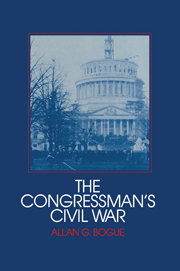Book contents
- Frontmatter
- Contents
- Acknowledgments
- Introduction
- 1 The paths of power: congressional career lines and the coming of war
- 2 Lincoln and the “disorderly schoolboys”: a chapter in executive–legislative relations
- 3 An “inquiring disposition”: the investigative process in the House of Representatives
- 4 “God alone can guide us”: authority structures in the House of Representatives
- 5 Conclusion
- Appendix: Representatives and senators who died in office, 1844–1865
- Notes
- Sources cited
- Index
2 - Lincoln and the “disorderly schoolboys”: a chapter in executive–legislative relations
Published online by Cambridge University Press: 07 September 2010
- Frontmatter
- Contents
- Acknowledgments
- Introduction
- 1 The paths of power: congressional career lines and the coming of war
- 2 Lincoln and the “disorderly schoolboys”: a chapter in executive–legislative relations
- 3 An “inquiring disposition”: the investigative process in the House of Representatives
- 4 “God alone can guide us”: authority structures in the House of Representatives
- 5 Conclusion
- Appendix: Representatives and senators who died in office, 1844–1865
- Notes
- Sources cited
- Index
Summary
No American president has so caught the interest of historians as has Abraham Lincoln; the great Illinoian towers above the other political figures and the great soldiers in the scholarly literature of the Civil War. That he merits careful attention none can deny, and such an emphasis is all the more pleasing when the subject has so many admirable qualities – courage, honesty, forbearance, wide–ranging skills, humor, a marvelous command of the language, and, in the end, a martyr's death after victory had been achieved in the field. To sit with Lincoln at the White House, or follow him in his sauntering walks to read dispatches at the War Department, is to be in the very cockpit of the war. In his person the manifold threads of arms and policy come together. Within the checks and balances of the American government, Lincoln was chief executive, head of the executive branch. But east and south down Pennsylvania Avenue the Capitol glistened, and there men had their own ideas of how the war should be fought, different in significant respects from those Lincoln stubbornly maintained. Many of the lawmakers were little trained in the legislative arts, as we have seen, and were undisciplined “disorderly schoolboys,” as a friend of one Speaker of the House put it.
- Type
- Chapter
- Information
- The Congressman's Civil War , pp. 29 - 59Publisher: Cambridge University PressPrint publication year: 1989

